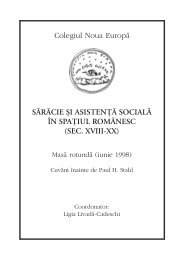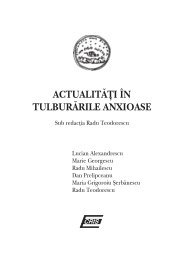New Europe College Regional Program Yearbook 2001-2002
New Europe College Regional Program Yearbook 2001-2002
New Europe College Regional Program Yearbook 2001-2002
Create successful ePaper yourself
Turn your PDF publications into a flip-book with our unique Google optimized e-Paper software.
N.E.C. <strong>Yearbook</strong> <strong>2001</strong>-<strong>2002</strong><br />
134 The Law of Republic of Moldova regarding the rights of persons belonging<br />
to national minorities and juridical status of their organizations, No. 382-XV<br />
/ 19.07.<strong>2001</strong>, Article 2.<br />
135 The study The Relationship between Romania and the Republic of Moldova,<br />
22 Plus, January 25, 1995.<br />
136 The first “cliché” deconstructed by authors was the manner in which the<br />
political leaders conceived the current territorial borders as the negative<br />
consequences of the Ribbentropp-Molotov pact. The authors demonstrated<br />
that the current frontiers were not consequences of the pact, but of the<br />
Peace Treaty (Paris, 1927), which established the territorial reality based on<br />
the relation between the conqueror and the defeated. Another cliché rejected<br />
in the study was the expression “mother country”, which in the authors’<br />
opinion no longer expressed the historical necessities. The study criticized<br />
the leaders of Romania who, from the position of Mutterland, protested<br />
against the decision of Parliament in Chiºinãu in April 1994, to adhere to the<br />
Community of Independent States and against the adoption of the<br />
Constitution of the Republic of Moldova (29 th of July 1994), which declared<br />
the Moldovan language the official language of the state. Op. cit.<br />
137 Op. cit.<br />
138 Op. cit.<br />
139 Yael Tamir draws the distinction between choice of identity and assumption<br />
of identity, assumption being more moral than simple choice. Assumption<br />
is also the only possible “choice” of identity. Liberal Nationalism, Princeton<br />
University Press, 1993, p. 50.<br />
140 Op. cit., p. 50.<br />
141 Op. cit., p. 48.<br />
142 This is reminiscent of Pierre Bourdieu’s term ‘habitus’ conceived as “systems<br />
of durable, transposable dispositions, structured structures predisposed to<br />
function as structuring structures, that is, as principles of the generation and<br />
structuring of practices and representations which can be objectively<br />
“regulated” and “regular” without in any way being the products of obedience<br />
to rules “produced by” the structures constitutive of a particular type of<br />
environment (e.g., the material conditions of existence characteristic of a<br />
class condition). Pierre Bourdieu, Outline of a Theory of Practice, Cambridge,<br />
Cambridge University Press, 1977, p. 72.<br />
143 The questions “Who are the Romanians in Moldova?” and “Who are the<br />
Moldovans in Moldova?” are still waiting for an explanation, based on<br />
empirical data, collected by sociological inquires, interviews in focus group<br />
and another empirical studies.<br />
144 Those in Moldova who have the right to vote in elections in Romania,<br />
Russia, and Ukraineand give vote for the most nationalistic parties.<br />
145 Common citizenship provide a political framework for the representatives<br />
of all ethnic groups, however, despite their ethnic origins, members of other<br />
72







